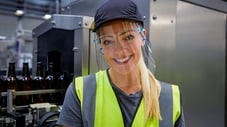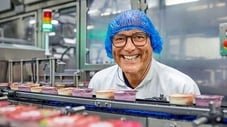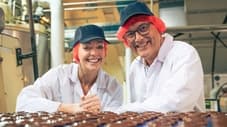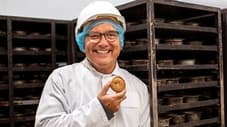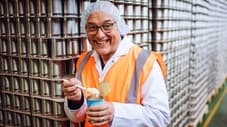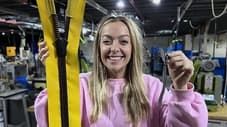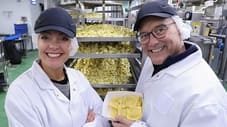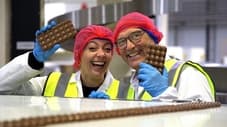
Inside the Factory (2015)
← Back to main
Lucy Carter — Executive Producer
Episodes 21
Cider
How the world's biggest cider producer makes more than 350 million litres each year - from orchards in Herefordshire, to the mill in Ledbury, to fermentation and bottling at the factory. How grafting is used to create a new sweet apple variety called Scrumptious. How a by-product of making cider - CO2 - is used to make fire extinguishers. The history of the Victorian apple-breeding boom, and recreating one of Queen Victoria's favourite baked apple desserts.
Read MoreSocks
How a Leicester factory makes one and a half million socks annually. What causes smelly feet, and which socks tackle it best. How a cotton spinner in Manchester produces 4,200 miles of yarn every hour. A revolutionary eco-cotton supplier. The history of 1980s sock fashion, and how the 'Kitchener stitch' helped save the feet of British soldiers in the trenches during the Great War.
Read MoreYoghurt
How one million pots of yoghurt are produced every 24 hours in rural Somerset - from the Friesian cows that provide the milk to the processing, culturing, and packing processes. How blackcurrant are harvested. Plant-based alternatives to milk. Food-safe yoghurt pots made from 100% recycled material. The history of the electric milk float and the contentious origins of the cream tea.
Read MoreChristmas Cards
How Woodmansterne produces 35 million greeting cards a year in Watford - from sketching a card design, to creating an aluminium plate for printing, to guillotining the sheets into cards and the final shipping process. Creating a vegan Christmas feast. The history of the year Christmas was cancelled.
Read MoreDiggers
How JCB make as many as a hundred iconic yellow diggers every single day in Rocester, Staffordshire, requiring just 45 hours to make a digger from scratch, and consuming 650 tonnes of steel, 170,000 bolts, 5,000 litres of paint and 236 miles of wiring each week.
Read MoreTrains
How Alstom builds a 187-tonne, five-carriage electric train on their 84-acre site in Derby. How the train's aluminium is made at the UK's last remaining smelter in Scotland. How tunnel boring machines are digging ten miles through the hills for the new HS2 line. The history of the UK’s first electric train - Brighton's seafront tourist train, still used today - and how that technology went on to be used in underground transportation all over the world.
Read MoreBuses
How London's famous red double-decker bus - including a fully electric model - is built in Scarborough, Yorkshire, highlighting the tough laminated heated windscreens and bright red coat of paint. How the turbines at an offshore wind farm convert wind into watts. The history of London's earliest double-deckers and their vital role in the First World War.
Read MoreJaffa Cakes
How a factory in Manchester churns out 6 million Jaffa Cakes every single day - 1.4 billion per year. The legal significance of whether Jaffa Cakes are cakes or biscuits.
Read MorePork Pies
How Vale of Mowbray make pork pies - including 425,000 a week of their 75g snack-sized traditional pie - in Northallerton, Yorkshire. Hacks for the perfect vegan shortcrust pastry. How piccalilli, a pork pie accompaniment, is made. The history of Britain's unusual stargazy pie, and powdered egg during the Second World War.
Read MoreRice Pudding
Gregg Wallace explores the Ambrosia factory in Lifton, Devon, to reveal how it makes up to 360,000 rice puddings every single day. How fresh water from the Alps is used to grow more than a million tonnes of rice every year in Italy's Po Valley. The history of school dinners.
Read MoreMints
How Polos produce 32 million mints every day in York - part of the 19,000 tonnes of mints consumed every year in the UK. The largest sugar beet factory in Europe. How one of the last surviving peppermint farms in the UK harvest their crop. How clever marketing persuaded people to buy minty mouthwash.
Read MoreYorkshire Puddings
How Aunt Bessie's produce a staggering 500 million Yorkshire puddings every year in Hull. How wheat is tested before it can be milled into flour. How to cook the perfect gravy for a Sunday roast. The history of the roast dinner, and the art of washing up Tudor-style.
Read MoreJelly Beans
How Jelly Bean Factory make ten million of their colourful little sweets every day in Dublin. The important role glucose plays in our bodies. How one of the ingredients in jelly beans plays a key role in the production of lipstick. The history of jelly and post-war pick'n'mix.
Read MoreJeans
How denim cloth is made, and how Welsh jeans brand Hiut transform it into one of the world's most popular items of clothing - jeans. How zippers are made. How denim is distressed to make a new pair of jeans look old, in environmentally friendly ways. The little-known person who helped shape the design of jeans forever. The history of indigo dye.
Read MoreStuffed Pasta
How Dell Ugo make 500 million stuffed pasta parcels every year in Hertfordshire. How Cromer on the Norfolk coast still use traditional fishing techniques to catch the crab for stuffed pasta. How Italian immigrants in Bedford helped to build Britain. The origins of gluten-free food.
Read MoreStout
How Guinness make two million litres of Irish stout every single day. How reservoir water is treated to provide clean drinking water to the people of Dublin, as well as to the stout brewery. How hops are harvested at a farm in Worcestershire. The history of Irish pubs, and how pub games helped the Allies in the Second World War.
Read MoreBath Bombs
How Lush produce an astonishing 14 million bath bombs every year in Dorset. How taking a hot bath can provide some of the benefits of exercise. How a lab grows human skin for cosmetic testing. The notion that complex perfumes ward off the plague. How the living conditions of coal miners and their families were transformed by the introduction of communal showers.
Read MoreCarpets
How Axminster produces 46,000 square metres of carpet every year in Devon. The science behind the best ways to remove stubborn stains from carpets such as butter, milk and red wine. How the groundbreaking methods of a Devon-based carpet maker in the 18th century revolutionised intricate carpet making. The rise and fall of the hard-wearing flooring linoleum.
Read MoreChocolate Bars
How Nestle make more than eight million bars of chocolate every day in York - the UK's city of chocolate. How a cocoa plant quarantine facility in the Berkshire countryside is preventing a worldwide chocolate shortage. The bitter history of drinking chocolate.
Read MoreSofas
How HSL make more than 5,000 sofas every year in West Yorkshire. The science of light bulbs, to create the perfect environment to snuggle up on the sofa. How foam padding is produced. The history of the sofa. One of the world's most famous sewing machines.
Read MorePaint and Wallpaper
How Farrow & Ball produce up to 200,000 litres of paint and 10,000 metres of wallpaper a week in Dorset. How a key ingredient in paint-making is mined in Devon. The art of hanging wallpaper, and its history. How ships in the First World War were painted with dazzling patterns to evade German submarines.
Read More